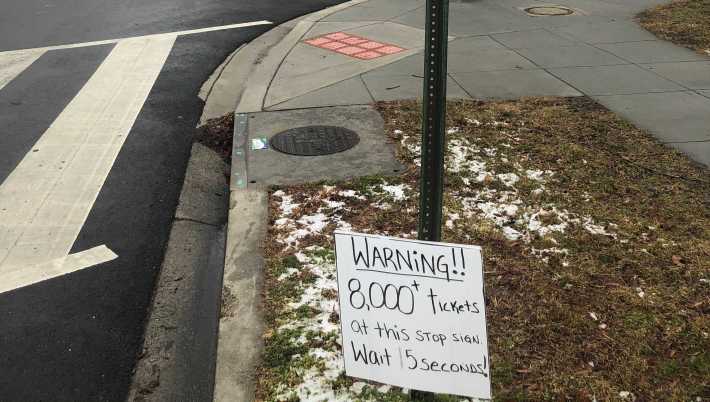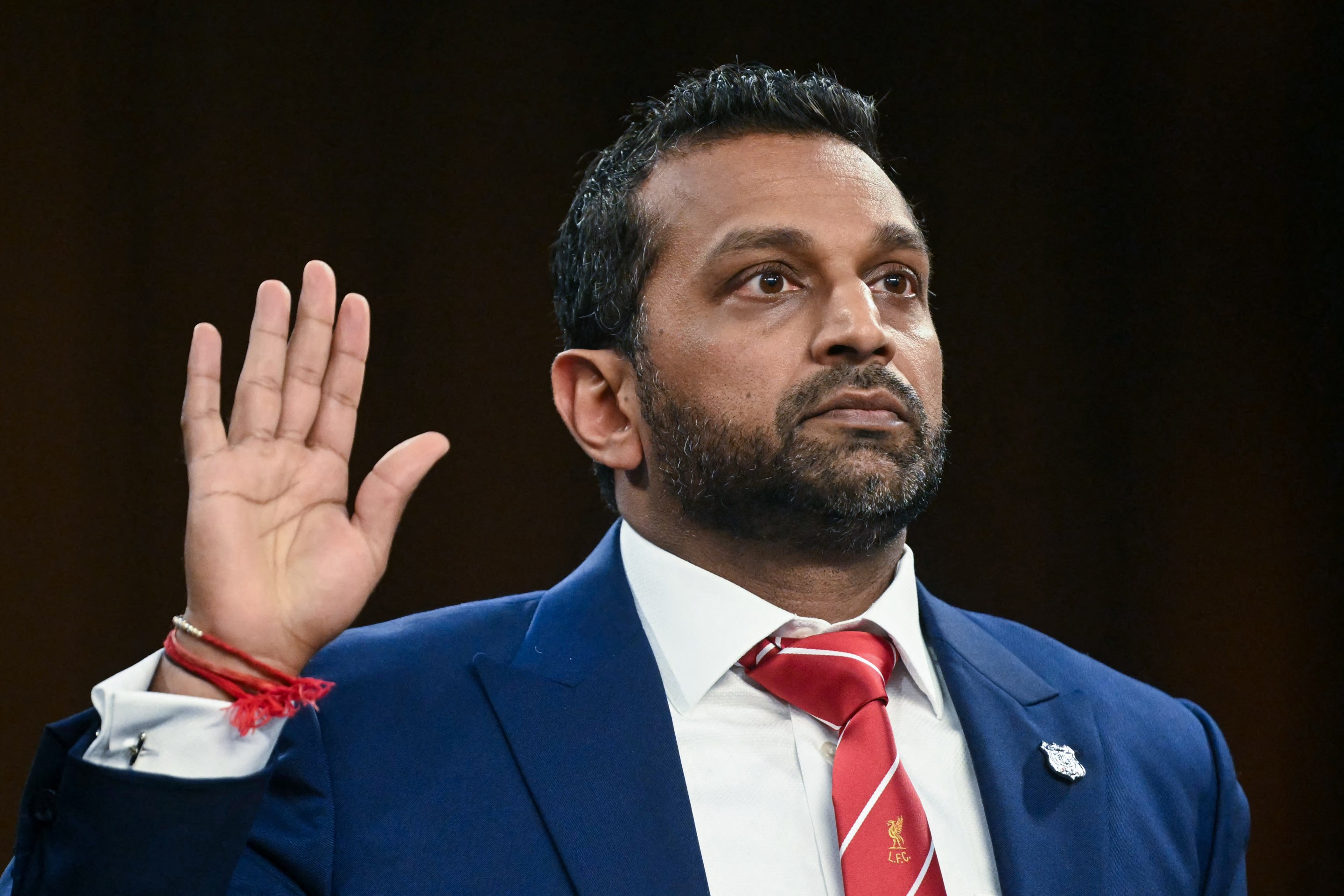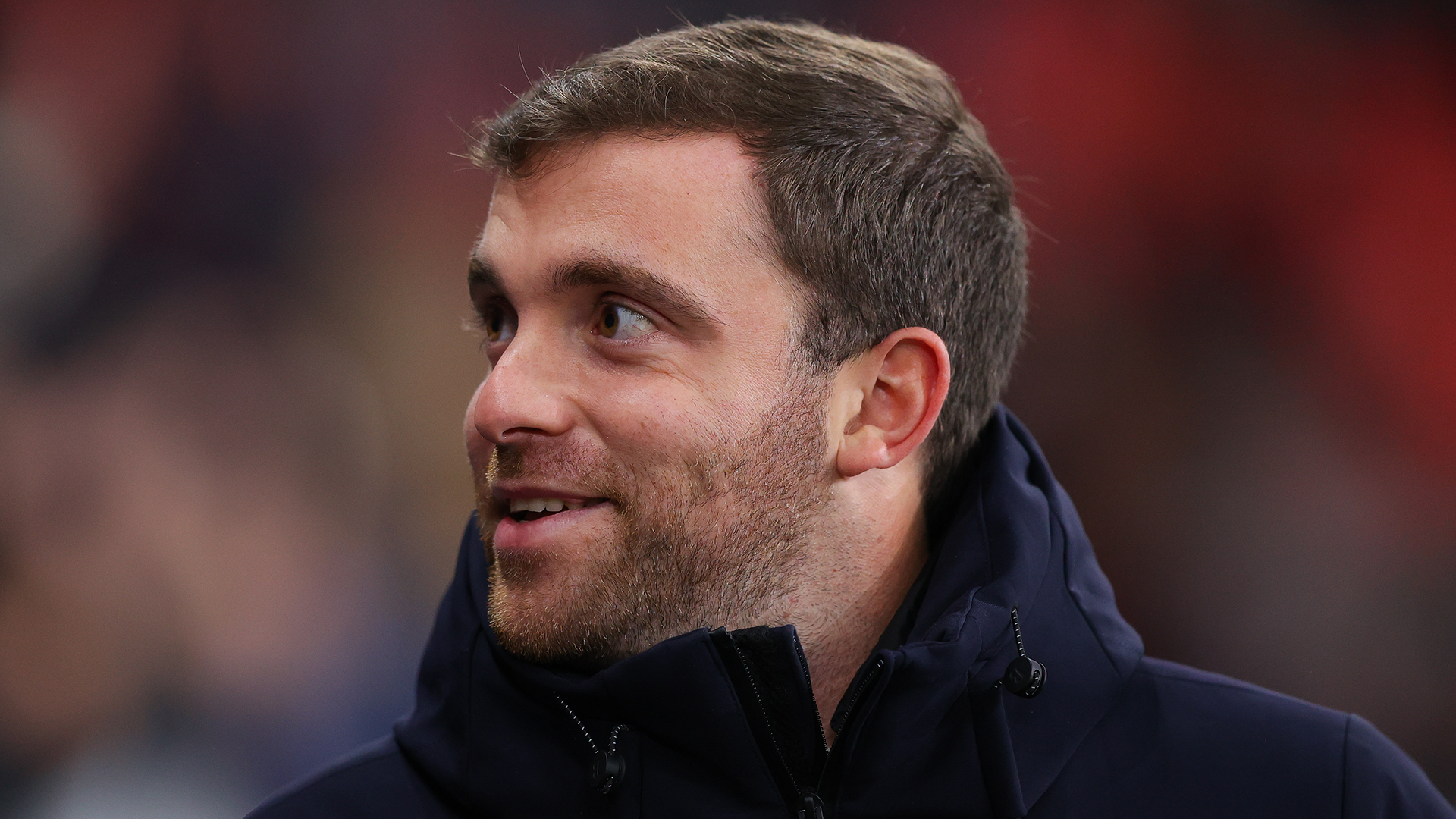Traffic cameras can cross the thin line in law enforcement between keeping citizens safe and fucking them over.
Full disclosure: I’m counting myself among the fucked over. In late August, I was notified by the photo enforcement wing of the D.C. Department of Motor Vehicles that I’d been issued four tickets for “passing” the same stop sign on four different occasions. Two of the tickets were written on the same day. A stop-sign camera, the lowest-form of traffic cam yet unleashed, got me. The fines totaled $400.
I try to obey parking and traffic laws. Obsessively even. Not because I’m cautious or a good citizen. Because I’m cheap as hell! And I know from experience that D.C. ticket writers will nail you every time you give them a reason to, and lots of times even when you don’t. Anybody who’s lived here for any time or even visited much can affirm.
The last time I wrote a story about the city’s hyperaggressive ticketing strategies was in the early 1990s. At the time, violent crime was so out of hand here that the place was known as America’s Murder Capital. But local government’s most obvious crime-fighting efforts came in the parking realm. D.C. was making so much money off parking violations that officials were actually putting on seminars for leaders from various states and even foreign governments on how to increase revenues through ticket writing. I lived in the very dense Mount Pleasant neighborhood back then and legal parking was hard as hell to find. But even if you found a spot you weren’t safe. I’d sometimes spend 15 minutes driving around before landing a spot without a “No Parking” sign in play and no painted curb or fire hydrant nearby or any sort of hint at all that this space was off-limits, only to return to my car an hour later to find a pink slip underneath the windshield wiper bogusly saying I’d violated the two-hour maximum time limit, or finding handwriting on the ticket saying my vehicle was “less than 40 feet” from an intersection or driveway or whatever the ticket writer needed to help meet his or her quota and slap me with a $25-and-up fine. I remember coming out of my apartment one morning and seeing a posse from the Metropolitan Police Department (MPD) walking down the main drag, Mount Pleasant Street, and leaving a ticket on just about every windshield. I asked an officer what was happening and was told that they’d been ordered by their commander to enforce a law requiring all parked cars to have their wheels turned toward the curb. (Who knew such a law existed?)
The city made contesting a ticket an all-day affair in which you’d lose in the end anyway. Your car would get “booted” and towed by the city if you amassed more than three unpaid parking tickets or total fines above $200, and you couldn’t register a car or get a vehicle inspection or renew a drivers license in the city without settling your DMV bill. I pretty much always had more than three outstanding tickets, and the penalties doubled after a month, so I often owed the city more in fines than my beater Toyota was even worth. I worked hard trying to beat the system. I stayed on the road by registering my car at my mom’s address in suburban Virginia, and using that same address for my driver’s license. I was constantly going to the Virginia DMV and paying a $25 fee to get new license plates that wouldn’t be on D.C.’s boot/tow list, which surely had my old tag numbers on it. I knew at the time that my fight wasn't exactly righteous. But, well, the city wasn't exactly observing Marquess of Queensberry Rules with me either.
The car wars ended when my jalopy got stolen. Losing the car, even by theft, actually came as a relief. I didn’t own another vehicle until I left Mount Pleasant in 2002 for the Petworth neighborhood and all its street parking.
I hadn’t really thought of the ticketing horrors from my past since the move. But the four stop-sign violations at the same intersection—at $100 a pop!—brought all the bad memories back. The city’s letter to me telling me about the tickets said there was video of my offenses online. I was able to access only one of the four clips. It was indeed my car in the shot, and it showed that as I approached the four-way stop I slowed down to almost zero miles an hour, but hell if I ever came to a dead stop. The old California stop. By the letter of the law, I was a violator. Dammit.
But this massive punishment still felt off. I’ve been living about 200 yards from that four-way-stop intersection for 19 years now, and have known about that stop-sign camera for a huge chunk of that time. But I’d never gotten a single ticket from it. I’d never even heard of anybody else in the neighborhood getting nabbed. But here I get four in one load of mail.
So I started looking into the camera that nailed me. Turns out it holds a special place in the shitty history of traffic enforcement. The American Automobile Association described D.C. as the first major city to use photo enforcement for stop-sign violations. And the stop-sign cam in my neighborhood, installed in 2013, was the first ever in D.C. I found a segment from NBC’s The Today Show on the introduction of stop-sign cameras that had NBC reporter Tom Costello doing his stand-up from the same intersection where seven years later I’d get nabbed. Costello boasted about all the safety benefits the new technology would bring, while Cathy Lanier, chief of the Metropolitan Police Department at the time, told the morning show audience that the cameras were set up because “our community has asked us to enforce the law.”
“Now we’ll be able to do it with less manpower and safer for police officers,” said Lanier (who left the city a few years after bringing in the cameras to join the NFL as senior vice president in charge of security).

I also found a neighborhood message board with several live threads about the stop-sign camera, full of posts from angry locals who’d been recently nailed at the same intersection. The more I read, the easier I felt I'd got off: Others told of getting double-digit tickets, meaning they were facing a four-figure fine. Somebody posted a short video of the camera snapping photos of a car that stopped dead at the intersection.
This particular stop-sign camera’s fortunes, however, may well have turned when it flashed at Deepak Gopalakrishna.
Gopalakrishna happens to be a transportation engineer with a specialty in road safety. He’s lived in Petworth for years and told me he hadn’t ever gotten a ticket on Kansas Avenue NW until this summer. He started asking around and found that just about everybody else on his block had also gotten multiple $100 fines. He said his professional background and personal leanings have had him support pro-bike, “not car-friendly” programs like the Vision Zero project. And he said he has no fixed bias against speed cameras and red light cameras. But the rate at which he’d been nailed told him that this stop-sign camera had to go.
“I’ve got five tickets,” Gopalakrishna told me. “Before I found out about the first one, I’d gotten four more.”
Gopalakrishna FOIA’d for information on the equipment being used by the city for its stop-sign camera setup and just how many tickets had been issued at that one intersection. He learned that the stop-sign cam’s sensor in Petworth, a Smartmicro UMrr-11 Type 44 Radar Antenna, had been recalibrated on June 5, 2020. A ticket boom commenced soon after.
Data from MPD shows that in June 2020, the camera in question snapped 82 violators. Then there were 2,850 tickets in July 2020 (compared to 231 tickets in July 2019). Then the camera started flashing like paparazzi in Cannes: From August through November, a total of 17,216 tickets were issued. That’s $1,721,600 from one camera at one intersection in just four months.
Again, I learned years ago that D.C. had a black belt in ticket writing. But today’s stats floor even me. D.C. DMV documents show that the city issued 2,869,810 traffic and parking tickets in fiscal year 2019, with fines totaling $375,916,124. That averages out over the year to more than four tickets and about $543 in fines for every man, woman and child living in the city, including those who don’t drive. (Comprehensive ticket revenues for 2020, which would include the Petworth stop-sign camera windfall, are not yet available.) This is a town with oodles of tourism and, pre-pandemic, teeming with commuters, so visitors paid lots of penalties. But the cam located smack in the middle of my residential neighborhood penalized D.C. residents far more than outsiders.
According to Gopalakrishna, there’s no obvious quality-of-life benefit to the citizenry for all the pain folks who live near a stop-sign cam must suffer.
“I want to be very clear: Being against this camera isn’t being against safety. This isn’t a safety matter,” he said. “This isn’t like a red-light camera or a speed camera. There’s no safety study, no data saying, ‘Wow, these stop-sign cameras really have had an impact on safety!’ There’s nothing. I can point to a lot of things that have worked and are known to work: rumble strips, certain lighting on that stop sign, for example. Take those steps, and you’ll get more people stopping, and you can talk about safety. But, those things don’t bring in revenue for the city. This camera does. And once you remove the safety component, it’s just targeting. Targeting one neighborhood.”
Gopalakrishna said he’s been unable to get answers on what exactly took place when the stop-sign camera was recalibrated in June. The user manual for the Smartmicro UMrr-11 Type 44 Radar Antenna, describes its utility only in speed camera and red light enforcement applications. There is no mention anywhere in the document of its use in a stop-sign camera setup.
“It’s frustrating because there’s no legal definition of what a full-stop is,” he said. “It’s all so arbitrary. So basically, this private company gets to decide what a complete stop is, and they set the camera to be triggered by that. And once you get triggered, [the D.C. government] just says, ‘Oh, yes, that’s a violation!’ This is a big problem for me. They changed the settings and recalibrated this camera. What if they said all of a sudden everybody who jaywalks in one neighborhood gets a ticket? Would anybody say that is fair?”
The Petworth stop-sign camera came from NovoaGlobal, a photo-enforcement services firm based in Orlando, Fla. Carlos Lofstedt, president of NovoaGlobal, told Defector that he has been providing traffic cams of all sorts to D.C. for a decade. Lofstedt said that his contract with D.C. does not call for the vendor to receive a commission based on how much money the camera brings in. “They pay us for services,” he said. “There is not any sort of shared revenue.”
Lofstedt said that NovoaGlobal’s latest contract was signed “in December.” In other words, as the one camera in Petworth was snapping more than $500,000 worth of photos in just one month.
Lofstedt politely declined to discuss any other aspects of the deal with the city.
Fueled by FOIA’d facts, Petworth activists and neighborhood message-board posters got together to draft a resolution demanding that they make amends for the overly aggressive stop-sign camera. First, the ticketed and peeved mob wants the DMV to recalibrate the camera to the same sensitivity it had before the ticket binge. Then they want all fines issued since the last recalibration rescinded. The petitioners also formally requested answers from city leaders on why Petworth was “targeted” for such aggressive enforcement, and not one of the city's “wealthier, whiter neighborhoods.”
Politicians have taken note. Janeese Lewis George, a D.C. city council member whose ward includes Petworth and who says she’s usually pro-traffic camera, plans on lobbying other city officials to erase all stop-sign camera debt.
“This stop-sign camera operates in a predatory way,” she said.
Gopalakrishna said fine forgiveness is the only way to go. “People who couldn’t pay $100 in a pandemic can’t pay $500. Nobody’s going to be able to get their licenses or cars renewed. This is going to be bad.”
I still haven't paid the $400. Anybody got some out-of-state tags lying around?






